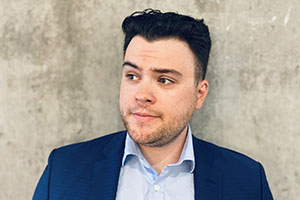
What is your current position?
International Trade Counsel (associate lawyer) at Cassidy Levy Kent (Canada) LLP
What attracted you to your program of study at the BSIA?
I wanted to do the MIPP program because it offered everything that I was looking for in a master’s degree. I knew from undergrad that I wanted to continue to explore international affairs, but I was less interested in a traditional master’s program. Indeed, the “real world” lens that the BSIA is all about appealed to me for this reason. I also liked that the MIPP had smaller class sizes as compared to competing programs but yet still offered accessibility to practitioners working on real global issues.
What was the most impactful experience you had while completing your graduate degree?
While I had a lot of great experiences during my MIPP degree, something I found particularly impactful was the connections that the faculty and staff at the BSIA had with people beyond the school. Importantly, our professors made great efforts to bring those voices to the classroom and expose students to the different ways our degree could be put to use.
Tell us about your job, what do you do?
I practice international trade law in the Ottawa office of one of North America’s top international trade law firms. At Cassidy Levy Kent, I assist Canadian and international clients with a range of international trade and related matters, including trade remedies, customs, economic sanctions, and matters related to trade agreements such as the CUSMA, CPTPP, CETA, and the GATT/WTO. Many of these files are litigation files where my colleagues and I appear before courts and various administrative decision makers. Accordingly, I have represented clients in matters before the Canadian International Trade Tribunal, the Canada Border Services Agency, the Federal Court of Appeal, and binational panels under international trade agreements such as the CUSMA. In addition to international trade, I also occasionally work on matters related to federal procurement contracts and bid challenges, as well as competition law. The largest part of my job day-to-day is trade remedies work. This means that as part of a team in Canada of around a dozen lawyers, I litigate anti-dumping and countervailing duties cases, often on behalf of Canadian manufacturing businesses. Trade remedies and international trade law in Canada is truly interdisciplinary, and my work involves a mix of considerations including law, economics, policy, accounting, and business. We work on tight timelines and our facts are always changing, so there is always a new angle to consider. That’s part of what of why I really enjoy what I do. Although the practice of international trade law in the private sector is largely rooted in domestic law, my practice is informed and impacted by the international sphere—all of which I first cut my teeth on at the BSIA.
How does your work help make a difference?
One of the biggest ways my job helps make a difference is that a lot of the work I do helps protect Canadian workers and businesses. As I mentioned earlier, I often represent Canadian businesses competing with goods from all around the world. Under the WTO agreements and Canadian domestic law, Canadian companies can seek relief via tariff protection to level the playing field when competing against unfairly traded imported products that are dumped or subsidized. By filing and litigating trade remedies cases, my firm helps Canadians level the playing field. Helping Canadian companies and their workers thrive is a rewarding experience.
What are the next steps in your career progression.. where do you see yourself going?
I knew for a long time that I was interested in international affairs, but I found my career in international trade law. Moreover, what makes everything worthwhile still is that I am fortunate enough to work with an awesome team of people who are all the best at what they do. I wouldn’t be where I am without them, and I want to learn even more moving forward.
What advice to you have for a potential student looking to complete their degree at the BSIA? Or for someone looking to work in Global Governance and International Policy?
Be open-minded. The career I have today was not set in stone. To be honest, I wasn’t sure what I actually wanted my career to look like when I started at the BSIA. Through my experiences in the MIPP program, I got on a path to law school at the University of Ottawa and eventually my career in international trade. I hadn’t intended to go to law school when I started at the BSIA, so the career I had today wouldn’t have happened in the same way had I not had an open mind as to what a career in international policy can look like. To that end, I can definitely say that the MIPP program played a big role in where I am today.